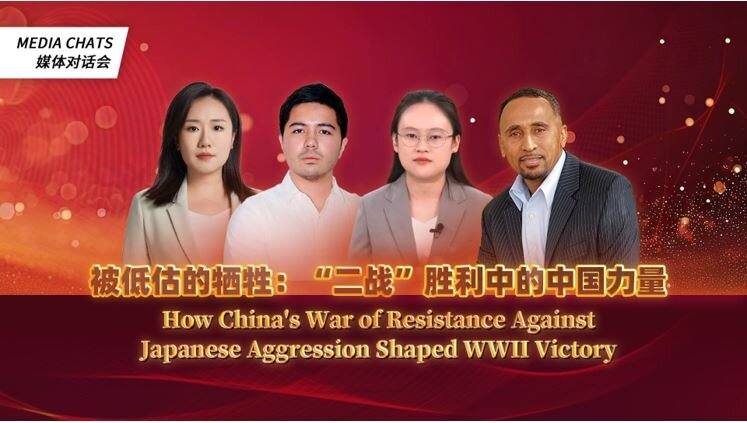The Forgotten Front: How China's War of Resistance Against Japanese Aggression Shaped WWII Victory

BEIJING- As we commemorate the 80th anniversary of China’s victory in the War of Resistance Against Japanese Aggression and the World Anti-Fascism War, it is time to re-examine the Eastern Front – a theater of war too often overlooked, despite the pivotal role it played in defeating fascism.
In the latest episode of Media Chats produced by CGTN Radio, I was joined by Dou Hongyu, reporter at CGTN Radio; Wes Cabangon, operations adviser and journalist at Business Mirror in the Philippines; and Garland Nixon, U.S. political analyst and radio talk show host. Together, we explored how China's war of resistance against Japanese aggression shaped the course of the Second World War and why that history still matters today.
A Bullet That Witnessed the Bloody Battle of Shanghai
Dou Hongyu revisited one of China’s most crucial battles during WWII: the 1937 Battle of Shanghai. She shared the story of General Zhu Fuxing, recounted by his son, Zhu Weiji.
According to Dou, General Zhu was ordered to take his men to defend several places in Shanghai. “He managed to do it. But in the end, he lost two thirds of his soldiers, but the Japanese were still coming again and again. They couldn’t leave. They didn’t give up,” she said.
“In the end, General Zhu Fuxing fought for seven straight days and nights without any sleep until he was shot and lost consciousness on the battlefield… There were three bullets in the body of Zhu Fuxing. The doctor took out two of them with the rest, one only one centimeter away from his heart. So he had to live with a bullet for the rest of his life.”
Dou emphasized the strategic importance of the battle. “That war convinced people that China could do a lot in their resistance against Japanese aggression. Before that, Japan said they were about to occupy China within three months, but just the Battle of Shanghai managed to hold them back for three months.”
The Wha-Chi Guerrillas and United Resistance
Wes Cabangon shared the story of the Wha-Chi guerrilla unit, a Chinese-Filipino resistance group that emerged during the Japanese occupation of the Philippines.
“The Japanese invasion in 1941 brought immense suffering to the Filipino people… But in the face of that hardship, Filipinos rose up through both organized military defense and grassroots guerrilla movements… It was in the spirit of shared resistance that the Wha-Chi, an anti-Japanese, Chinese-Filipino guerrilla unit, stood shoulder to shoulder with Filipino fighters,” Wes said.
“They started with only seven rifles. They managed to gain more munitions… At their height, they numbered at about 700 strong. They liberated several towns in the resistance efforts, from Japanese control here in my country.”
He added, “While direct wartime coordination between China and the Philippines may have been limited by geography, our people were united by a common struggle for freedom. That legacy should inspire us today to deepen our cooperation with mutual respect and open dialogue.”
“We’re Told Mostly About D-Day and Normandy”
Garland Nixon spoke candidly about the absence of China’s wartime contribution in American public memory.
“Unfortunately, in the United States, the story of WWII is told from the perspective of the United States… We’re told mostly about D-Day and Normandy invasion. In the Pacific, we are told about the naval battles… But sadly, the United States does not really expound upon the great sacrifices that were made by the Chinese people.”
Garland noted that most Americans have “very little” understanding of China’s contributions. “It’s very difficult for United States citizens to understand the Chinese perspective… And sadly, we are not taught here in history and in schools about the sacrifices and the contributions of China.”
“We’re Doing That for Peace, Not for Hatred”
As the conversation drew to a close, Dou reflected on why remembrance matters.
“I think each time when we commemorate our victory over fascism, there would be some voices saying that we're doing this to spread hatred, but that's just the opposite. We're doing that for anything but hatred, we're doing that for peace,” she said.
“Among all those people related to the World War Two that I interviewed, none of them talked about hatred. What they want is more peace, because today we have great technologies in great conditions for us to live a better life.”
She continued, “We can choose either to live a peaceful life or fascism might rise one day and people may lose their dignity. And every one of us today could be a victim… So I think it is our responsibility to tell people that we commemorate our victory over fascism… for peace, for a better life, not for hatred.”
As Wes noted in his closing remarks, remembrance is not just historical, “it’s deeply personal,” he said. “My great grandfather was among those that who lost their lives during the war. So this must happen, or like many families in Asia, we carry those memories with quiet dignity.”
For Garland, sharing these stories offers a path forward. “It has helped me to understand the importance of helping to spread the information about the sacrifices that the Chinese people made during World War Two…to help spread the word to the American people.”
In today’s complex global landscape, the message is clear: peace is never given. It must be protected – through truth, memory, and international cooperation.
About author: Xu Yawen, a Chinese journalist and a host with CGTN Radio based in Beijing, covering Chinese foreign policy, technology, and the economy.
Source: China Global Television Network (CGTN)
Leave a Comment